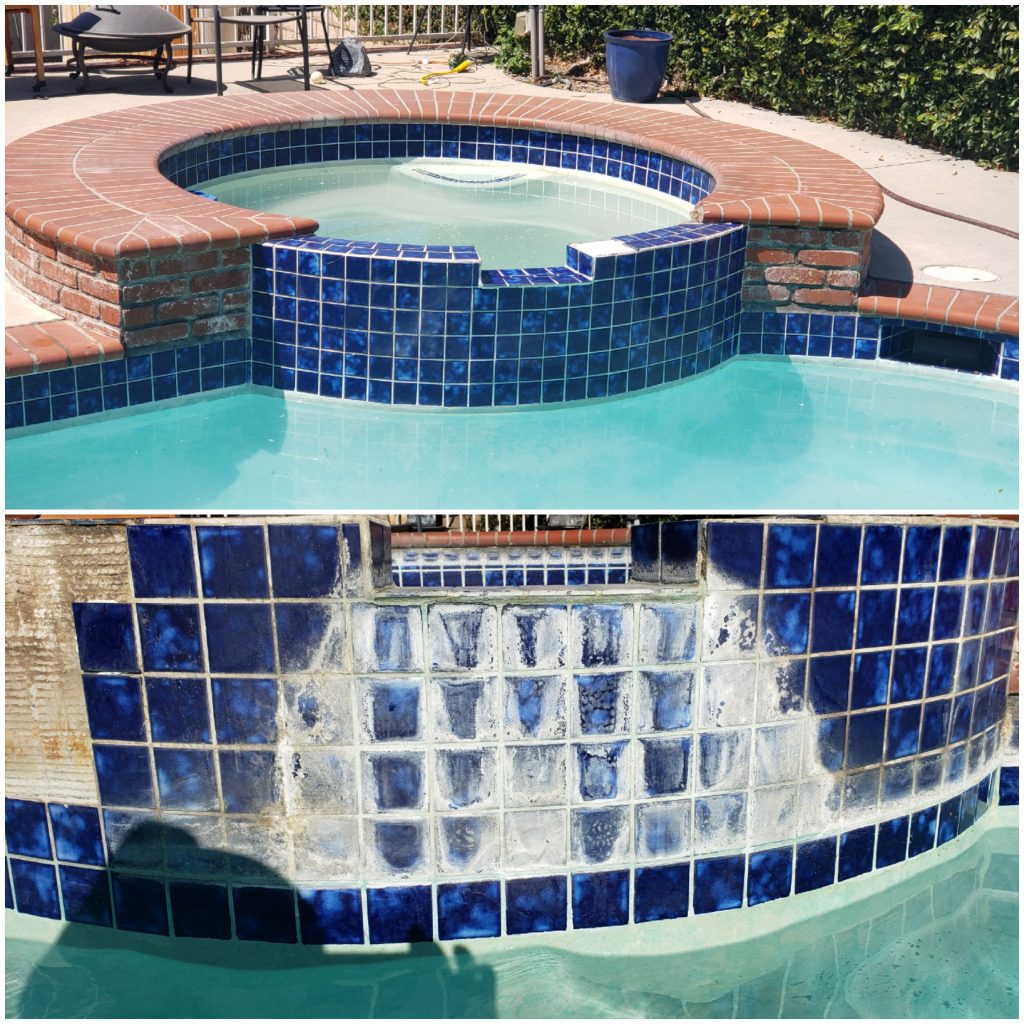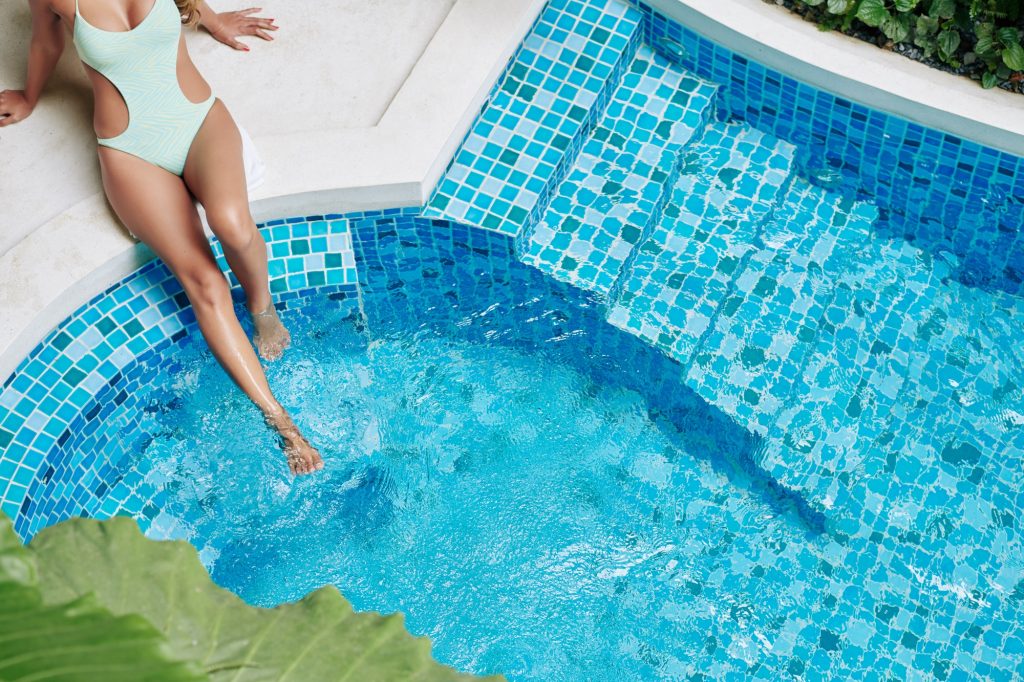Are you tired of seeing those irritating calcium buildups that turn your beautiful pool into an ugly sight? It is very important for homeowners and pool owners to use effective calcium cleaning in pools methods to keep their swimming pools clean. This is because too much calcium in your pool water can cause stubborn deposits on the surfaces of your pool, its equipment, and even in your plumbing lines.
This does not only ruin your pool’s appearance, it can also be a health risk for you and your family members. That is why we have written this guide to show you the reasons for calcium buildup in your pool and share some effective methods for calcium cleaning in pools to enjoy your swimming pool for many years.
Let’s get started!
Key Highlights
-
- You can use simple DIY calcium cleaning methods and common house ingredients like white vinegar to remove calcium deposits in your pool. For effective calcium cleaning in pools, it’s important to focus on removing stubborn calcium buildup to maintain water clarity and prevent damage to your pool’s surfaces.
-
- If you want a more effective calcium cleaning method for your pool, you should call a professional pool cleaner.
Understanding Calcium Buildup in Pools
Let’s start with the basics and talk about calcium buildup in your pool. This happens when hard water dries up. Hard water has a lot of calcium and other minerals (calcium and magnesium) and when it evaporates, it leaves behind those mineral deposits, which are called scaling. You can easily see them in places that have hard water. They create an ugly white or chalky spot on your pool surfaces, like your tiles, walls, and the bottom of your pool, including the shower walls and faucet. Regular calcium cleaning in pools can help keep these spots under control and maintain the cleanliness of your pool.
As the calcium levels in your pool go up, the deposits become harder to remove. They form hard water stains. This is what makes your pool look dull and less inviting. If you notice any early signs of mineral buildup like white rings at the waterline of your pool or if your tiles feel rough, it’s essential to use effective calcium cleaning in pool methods. These methods will help return your pool to its sparkling and healthy state, ensuring its longevity.
Preparing Your Pool for Calcium Cleaning
Before you start your calcium cleaning process, you need to get your pool ready. What we mean is that you need to balance your pool water first by adjusting its pH and alkalinity levels. A good pH level should be between 7.2 and 7.8. At this range, your calcium cleaning solutions will work better. Next, you should skim the surface of your pool to remove any debris. Then, brush your pool walls and floor very well to remove any deposits and ensure your calcium cleaning in pool products works better.
Don’t forget your safety too. Ensure you wear protective gear like rubber gloves and eye protection to be safe while using some cleaning solutions. You can also use some special tools and equipment like a pumice stone to gently scrub calcium deposits off pool tiles and surfaces. For effective calcium cleaning in pool, a garden hose with a high-pressure nozzle will help you easily wash away the stubborn deposits and rinse off the cleaning chemicals like bleach you used with clean water. Ensure you don’t inhale toxic fumes in this process, and use a dampened sponge to wipe off any remaining residue.
If the calcium buildup in your pool is still tough, you can use a pool acid brush and acidic cleaners. However, it’s best to leave your pool calcium cleaning in pool to professionals so that you don’t hurt yourself or damage your pool equipment.
DIY Methods for Removing Calcium Deposits
Here’s the truth: you can use simple DIY-safe pool cleaning methods and common house ingredients to remove these calcium carbonates from your swimming pool. These methods, including calcium cleaning in pool, are a sustainable and cheaper choice when you compare them to strong chemicals. Here are some DIY methods you can use:
Vinegar solution: A natural approach
If you have white vinegar in your home, then you can remove mild-to-moderate calcium buildups in your pools. It’s a natural cleaner that can help you to dissolve calcium deposits in your pool.
Here’s an easy way to use white vinegar to clean your pool:
-
- When you want to make your vinegar solution, mix equal parts of white vinegar and warm water in a spray bottle.
-
- Then spray the solution well on the calcium deposits in your pool, especially on your pool tiles, walls, and the waterline.
-
- After that, wait for at least 30 minutes so that the vinegar can break down the deposits.
-
- Then use a stiff brush to scrub the areas and rinse them well with clean water.
If you want to boost your cleaning, you can add a little lemon juice to your vinegar solution. For high levels of calcium buildup, reach out to pool cleaning professionals.
Using muriatic acid for stubborn deposits
Sometimes stubborn calcium deposits may refuse to come off with easier cleaning methods. In such cases, you can use a muriatic acid, also called hydrochloric acid, for calcium cleaning in pool. But, you need to be very careful when using this strong chemical because it can cause damage.
So make sure you always wear your safety gear like gloves, eye protection, and a mask when you work with muriatic acid. Ensure you carefully follow the instructions given by the manufacturer when mixing the acid.
Then put the solution on the areas in your pool that are affected with calcium deposits. Let it sit for the right amount of time, then scrub and rinse the area very well. However, if you don’t know how to use muriatic acid, you should talk to a pool professional. They can help you use it safely and effectively on the entire surface.
Professional Techniques for Calcium Removal

Here’s something you should know: when you are dealing with tough calcium deposits, it’s wise to call professional pool cleaners. These experts have special tools and know the best calcium cleaning methods for your pool.
Bead blasting: A gentle yet effective method
Bead blasting is a calcium cleaning method used by professionals. They’ll shoot small, rough beads at high pressure to take off calcium deposits from your pool surfaces. With this method, your tiles and finishes are safe from damage.
Here’s the difference between bead blasting and regular sandblasting. Sandblasting can scratch and dull your finishes, but bead blasting uses softer materials to remove calcium deposits from your pool without damaging it.
For calcium cleaning in your pool, it’s wise to call a professional pool cleaner if you want to use a bead blasting method for calcium deposit removal, as it requires special tools and skills. So, talk to a reliable pool service provider. They can help you understand your needs and tell you if it is the right method for your pool cleaning.
Professional chemical treatments and their benefits
Professional pool cleaners also use special chemical treatments to address specific types and severities of calcium buildup in your pool. These treatments are more effective than DIY solutions and require careful handling and application by a trained professional.
They’ll use hydrochloric acid, which is a powerful chemical that is used in professional pool cleaning to effectively dissolve calcium deposits in your pool. However, it is corrosive and will require an expert pool cleaner to prevent damage to your pool surfaces and ensure your safety. They’ll also use a scale inhibitor treatment to prevent future calcium buildup and maintain the optimal water chemistry of your pool. If you’re dealing with stubborn deposits, professional calcium cleaning in pool services can ensure thorough removal and long-term protection for your pool surfaces.
Maintaining a Calcium-Free Pool

If you want to keep your pool free of calcium, then you need to be active in your care routine. This means that you need to conduct regular maintenance in your pool, manage your water chemicals, and find places where calcium may come from and address them quickly. You should also check the chemistry of your pool.
For instance, if your pH level is high, it means that your pool water is alkaline, which can worsen calcium buildup. On the other hand, if your pool water is acidic, it can damage and wear down your pool surfaces. If you are using hard water, then adding a water softener can do as well. So, make sure you call a professional pool cleaner like Calcium killers to help you balance your pool water chemistry and maintain the right pH and alkalinity levels with the use of chlorine. Additionally, a certified technician can assist with calcium cleaning in pool and install a water softener in your living space for your health and safety.
Here in California, Specialty Aquatic Tile Cleaners are the right pool cleaners for you. With our tools, skills, and experience, we can assess your pool to know which calcium cleaning method will effectively remove those irritating calcium deposits in your pool. And guess what? Our services are fast and affordable. Reach out to us now!
Frequently Asked Questions
What causes calcium buildup in a pool?
Calcium buildup occurs when hard water evaporates, leaving behind calcium deposits on pool surfaces. Regular calcium cleaning in pool helps prevent these stubborn stains from damaging your pool.
How do I perform DIY calcium cleaning in my pool?
You can use natural methods like white vinegar or lemon juice to dissolve light calcium deposits. For tougher stains, calcium cleaning in pool may require using muriatic acid or hiring a professional for deep cleaning.
Is professional calcium cleaning in pool more effective than DIY methods?
Yes, professional calcium cleaning in pool services use advanced techniques like bead blasting and chemical treatments to remove tough deposits without damaging pool surfaces.
Can I prevent calcium buildup in my pool?
Yes, regular maintenance, balancing water pH levels, and using a water softener can reduce calcium buildup. Additionally, scheduling periodic calcium cleaning in pool will help maintain a clean and inviting pool.
What is the safest way to use muriatic acid for calcium cleaning in pool?
When using muriatic acid for calcium cleaning in pool, always wear protective gear, dilute the acid properly, and apply it carefully to the affected areas. If unsure, consult a professional to prevent pool damage.
How often should I schedule professional calcium cleaning in pool?
The frequency of calcium cleaning in pool depends on water hardness and maintenance habits. Experts recommend cleaning at least once a season or when visible buildup appears.
Can high pH levels cause more calcium deposits in my pool?
Yes, high pH and alkalinity levels contribute to calcium scaling. Monitoring your pool’s chemistry and regular calcium cleaning in pool will help prevent severe buildup.



